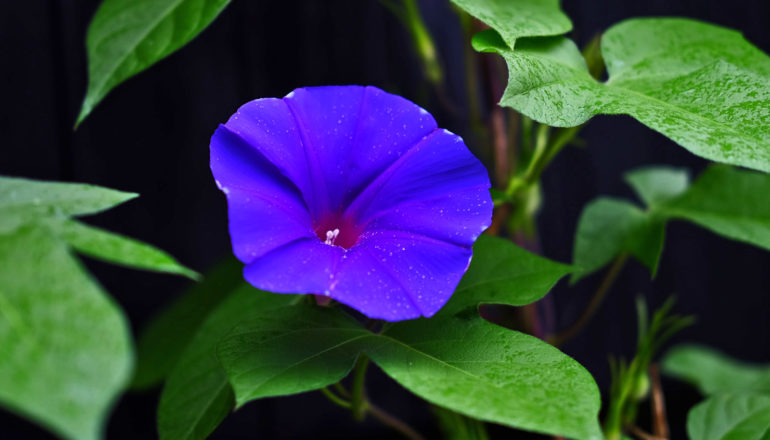
- Home
-
Home & Garden
- Food & Nutrition
Morning Glory Symbiosis May Yield New Psychedelic Drugs
- Barri Bronston-Tulane
- Read Time: 3 mins
nks to a symbiotic fungus, many species of morning glories contain elements of powerful psychedelic drugs called ergot alkaloids, according to new research.The seeds of the common tropical vine, whose namesake trumpet-like blooms only open in the morning, contain compounds that could be useful for treating mental and physical diseases as well as promoting well-being, says plant and fungal biologist Keith Clay, chair of the Tulane University department of ecology and evolutionary biology.
Researchers obtained samples of morning glory seeds from worldwide herbarium collections and screened them for ergot alkaloids, a compound associated with the hallucinogenic drug LSD, but which have also been used for treating migraine headaches and Parkinson’s disease.
Many morning glory species contain high concentrations of bioactive ergot alkaloids that are produced by specialized fungal symbionts passed down from mother plant to offspring through their seeds. Researchers found that one-quarter of over 200 species tested contained ergot alkaloids and were therefore symbiotic.
“The symbiosis and ergot alkaloids are specific to particular branches of the morning glory evolutionary tree, and each branch contains different ergot alkaloids and alkaloid mixtures,” Clay says.
Get The Latest By Email
Ergot alkaloids have had long and convoluted association with humans. Ergot alkaloids get their name from the ergot fungus responsible for deadly outbreaks of Saint Anthony’s Fire in the Middle Ages. The disease results from ingestion of the fungus. The best-known ergot alkaloid is LSD, a synthetic derivative of naturally occurring ergot alkaloids in morning glories produced by their fungal partners.
Indigenous peoples of Central and South America have historically used such alkyloid compounds for for their effects on the human mind and for regulating human reproduction. More recently they have been used for obstetric issues during labor and delivery and for treatment of migraine, Parkinson’s, and other maladies.
“We have known a lot about the fungal alkaloid chemistry and its effects on the mind and body for long time,” Clay says. “Our study is the first to show how highly coevolved morning glories and their symbiotic fungi are, and that coevolution is manifested by different mixtures and concentrations of ergot alkaloids across the morning glory evolutionary tree.”
Coauthors of the study in the journal Communications Biology are from Tulane, Indiana University, and the West Virginia University.
Source: Tulane University
About The Author
Barri Bronston-Tulanebooks_herbs
LATEST ARTICLES

What Actually Is Catnip and Is It Safe For My Cat?
Monday, 24 May 2021 08:28There are many valid theories to explain the global appeal of cats, including our obsession with watching videos of them online. In terms of cats’ pure entertainment value, however, our...

15 Minutes of Intense Activity Can Improve Heart Health
Saturday, 01 May 2021 08:12High-intensity interval training (HIIT) workouts have become popular in recent years for a number of reasons. They don’t require as much time as a regular workout (some can take as little as 10...

DIY Exercise Program: Stay Fit Without Breaking the Bank
Wednesday, 26 July 2023 12:55With the rising cost of living, gyms memberships and fitness classes are becoming increasingly unaffordable. But the good news is you can make just as much progress at home.

Volunteering in Late Life: A Shield Against Cognitive Decline and Dementia
Tuesday, 25 July 2023 16:09Volunteering in late life may be more than just a noble act of giving back to the community; it could be a critical factor in safeguarding the brain against cognitive decline and dementia.

The First Principle of Healing: Love Is The True Healer
Saturday, 15 May 2021 16:24There exist several approaches to obtaining optimal health, all of them important, each of them acting in some way on all the aspects of our beings. I know that if a technique were valid for...

How Injuries Change Our Brain and How We Can Help It Recover
Monday, 07 June 2021 08:07Injury to the adult brain is all too common. A brain injury will often show up on brain scans as a well-defined area of damage. But often the changes to the brain extend far beyond the visible...
New Attitudes - New Possibilities
InnerSelf.com | ClimateImpactNews.com | InnerPower.net
MightyNatural.com | WholisticPolitics.com | InnerSelf Market
Copyright ©1985 - 2021 InnerSelf Publications. All Rights Reserved. - Food & Nutrition

